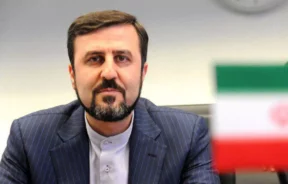Israel’s Strategy Toward Iran After Bashar al-Assad’s Fall
WANA (Dec 11) – Following the fall of Damascus and Bashar al-Assad’s departure from Syria, we once again see Israeli Prime Minister Netanyahu’s smirks and grins in front of the cameras.
The occupation of Syrian territory amid the chaos in Damascus and the destruction of Syria’s infrastructure isn’t the only thing that excites Tel Aviv’s politicians. They see their primary victory as the weakening of Iran’s regional power and are pursuing several strategies concerning the Islamic Republic of Iran:
1. Stirring Unrest Within Iran and Civil Protests
Israel believes that by raising certain doubts, they might create division among Iranians over the fall of Assad’s government. Doubts such as: Iran failed to keep Assad in power despite significant human and financial costs, or that Israel, by weakening Hamas, Hezbollah, and now Assad—Iran’s longstanding ally—has proven its military and political dominance.
In Iran, Western-leaning groups may feel pleased with what has happened in Syria, while supporters of the regime are frustrated that their leaders and armed forces didn’t react strongly enough to keep Assad in power.
While this sense of “joy” and “concern” exists in Iran’s political and social spheres, it’s clear that neither side hides its hatred for Israel or supports Israel’s exploitation of the situation.

Iranians step on the U.S. and Israeli flags during the 45th anniversary of the U.S. expulsion from Iran, in Tehran, Iran November 3, 2024. Majid Asgaripour/WANA (West Asia News Agency)
2. Claiming Iran May Shift Its Nuclear Doctrine
Israel speculates that Iran might revise its nuclear doctrine after the Syrian incident. By promoting this idea, Israel seeks to legitimize any future confrontational actions against Iran.
Over the years, Israel has inflicted numerous blows on Iran’s nuclear program, from sabotaging nuclear facilities to assassinating Iranian scientists. However, these actions have not hindered Iran’s nuclear advancements; instead, they’ve strengthened Tehran’s resolve to enhance its nuclear capabilities.
Until recently, there was no national demand within Iran for acquiring nuclear weapons. However, the constant threats from the U.S., Israel, and the West have amplified public calls for such a pursuit.
Contrary to Israeli expectations, portraying themselves as a terrifying and ruthless force does not frighten Iranians. Instead, it deepens their hatred for Zionists and strengthens their determination to use any weapon to punish extremist Jewish elements.
3. Exploiting the Lack of Response from Golan to Israeli Actions in Syria
Western think tanks suggest that the Islamic Republic and its allies have enough resilience that even their ashes could reignite and spread.
Undoubtedly, the developments in Syria have shocked the Resistance Front, but they cannot mark the end of its strength in West Asia. The Resistance Front and Iran’s capacity to strike Israel extend far beyond Assad’s fate.

The Fall of Syria and the Future of the Resistance Axis
WANA (Dec 08) – The leadership of Bashar al-Assad in Syria has been both a challenge and an opportunity for the Islamic Republic of Iran and for Assad himself. However, the victory of armed extremist groups could ignite unrest across the region and even Europe. This marks only the beginning of the Resistance Axis’ […]
Israel must always fear an Iran that armed and supported Hamas fighters, even when completely besieged by Israel. Today, Tehran can revive that capability, once again showcasing its strength and surprising Tel Aviv’s decision-makers.
The history of Western and Zionist media reminds us that during events like the Arab Spring or the invasions of Afghanistan and Iraq, they followed the same narrative: that Iran was the next target. Yet neither the Arab Spring nor these invasions led to regime change in Tehran. On the contrary, many analysts acknowledge that Iran emerged with more advantages from these events.
Tehran has consistently turned situations orchestrated by the West and Israel into opportunities for itself.
Who will ultimately benefit from the recent developments in Syria? Groups like Hayat Tahrir al-Sham and other armed factions may serve Turkish, Israeli, and Western interests as fighters, but they will never earn the trust of the Syrian people. In the coming months, more surprising news from Damascus is expected.
Iran’s next move in the Syrian arena might take shape in the coming months—this time stronger, with greater public and Arab support, as it confronts Israel.












